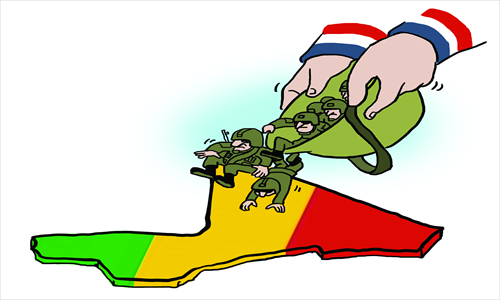Pacifist France was justified in decision to send troops to Mali

When looking for reasons behind France's uncharacteristically bold move to invade Mali alone, one doesn't have to look much beyond the country's sheer size.
Bigger than South Africa, Mali is a lynchpin of West Africa, a once hot prospect for democracy, model for the region, and a key former colony for France which had heavily invested in its future and resources.
When French President François Hollande assessed the need for France to intervene without the military support of its traditional allies, he may have considered three major factors.
First, Mali was a success story even among former French colonies which have traditionally fared better post-independence than former British ones.
Second, Islamist forces couldn't be allowed to entrench in such a vast country where they would be difficult to evacuate and so close to French interests in Morocco and Algeria.
Finally, much of the arsenal that had allowed Al Qaeda in the Islamic Maghreb's (AQIM) blitzkrieg into northern Mali came from Libyan weapons caches that the Allies had sold to Gaddafi but failed to secure after his fall. This is not to say that France has fully gone back on its traditionally hands-off approach to international peacekeeping.
French public opinion is still pacifist, and Hollande did recently refuse to send troops into the Central African Republic as rebels there neared the capital of Bangui.
This time, however, Hollande acted with almost a full consensus from political and public spheres. Given the reasons laid out above, it seems likely that Hollande felt a measure of personal responsibility to intervene, given France's role in letting the conditions in Mali fester.
For the moment, French public opinion is largely with him, as high as 75 percent according to certain polls. This is due to the country being exasperated with a situation in which French hostages were being held to ransom in Mali, another justification Hollande used for the assault.
Just like in any Western country, quick results in war are expected, but AQIM is a tough opponent, capable of leading attacks elsewhere in the region, as seen in the Algeria gas plant assault.
French casualties will likely mount, and if the toll gets too high, an already unpopular president may find himself in a very tricky situation.
Another factor for intervention lays in the confused leadership of the African Union. While a number of African countries such as Cameroon, Chad and Togo pledged troops to help the beleaguered Malian army, organizing such a mishmash of soldiers would be challenging.
Despite the slightly unpleasant overtones, having trained French troops to coordinate and lead the assault will prove useful.
Committing 2,000 French troops to the frontline was a worthwhile move, and French Defense Minister Jean-Yves Le Drian has proven an able diplomat, praising Malian troops for taking back ground with the "support" of the French, while also indicating that the recapture of Timbuktu will be left to the forces of the African coalition.
This allows the Malian army to retain a measure of pride in taking back its country without seeming like it has become wholly indebted to its former colonial masters.
However, despite securing good international PR and seemingly initial movement on pushing back AQIM, France finds itself somewhat isolated.
The US, UK and Germany have promised financial and logistical support for the fight in Mali, but have not so far proposed sending in ground troops.
Nonetheless, the hostages who were taken and killed by AQIM are not only French. They are British, American, German and Norwegian among others. Dozens of hostages have been confirmed killed in Algeria, with the body count likely set to rise further.
Although Islamist troops are being pushed back, and France has vowed to reconquer the whole of Mali, desert wars are almost always dragged out affairs.
But this one could be curtailed with the intervention of more foreign troops on the ground. Since this can't be ended peacefully, the only option left is to end it quickly.
The author is an editor with the Global Times. chrisdalby@globaltimes.com.cn